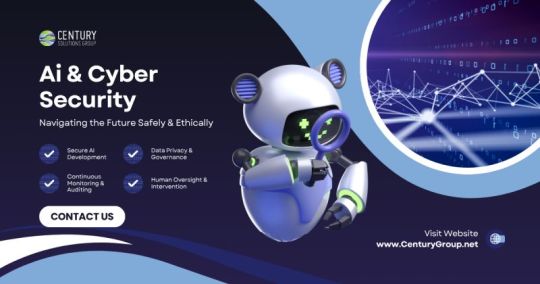#generative ai for cybersecurity
Explore tagged Tumblr posts
Text
Enhance & Improve your Cybersecurity with Artificial Intelligence (AI) Certification
Boost your cybersecurity skills with our AI Certification program, centered on the use of generative AI in cybersecurity. This course offers in-depth training on the latest AI technologies for enhanced threat detection and prevention. Get certified and become proficient in applying generative AI strategies to strengthen cybersecurity defenses. Ideal for professionals seeking advanced knowledge in AI-driven cybersecurity solutions, this certification equips you to tackle emerging cyber challenges effectively Read More.

0 notes
Text


What if he was human chat (he is human)
#tropical's art#digital art#art#collinlock16#minecraft arg but the protagonist is tired#I also find it super interesting that Kevin somehow made an antivirus that can detect entities#And in general just seems like a pretty solid antivirus#I also find it interesting that Digital Satan was a type of Malware (Worm) that also just so happened to be a sentient AI#Which I guess isn't really a paranormal entity#But falls under it I reckon#Do other entities have Malware classifications (that would be quite funny)#(Though only if the Kevin antivirus picks it up)#Kevin stop being a paranormal mercenary the cybersecurity world needs you#He is now a Computer Science major (headcanon) (dude should be in the industry) (he is a coder) (what a nerd)
70 notes
·
View notes
Text






Cyber Beach
#photo#photography#cyberpunk#cybercore#cyber y2k#cyber aesthetic#futuristic#futurism#cybersecurity#cybernetics#cyberpunk aesthetic#cyberpunk art#ai art#ai#ai generated#ai image#artificial intelligence#technology#machine learning#future#machine#beach#beachlife#beachwear#sea#lake#night beach#night#nightwing#sky
310 notes
·
View notes
Text








Cyberpunk2024
AI design
1:1
28
#cyberpunk#cybergoth#cybernetics#cybersecurity#cybercore#cyberpunk 2077#cyberpunk photomode#cyberpunk aesthetic#cyber#wave#wav#sun#son#design#sketch#sketching#pen#pencil#clothes#appearal#fashion#clothing designer#party clothes#clothing fashion#clothing#mens clothing#art#ai chatbot#ai generated#ai art
18 notes
·
View notes
Text
AI & Cybersecurity: Navigating the Future Safely & Ethically

The integration of Ai is revolutionizing cybersecurity, empowering organizations with unprecedented capabilities to detect, predict, and respond to threats at a scale. From advanced anomaly detection to automated incident response, AI is an indispensable tool in strengthening our digital defenses. We embrace the transformative power of AI. It offers immense potential to enhance threat hunting, streamline operations, and elevate our collective security posture. However, with great power comes great responsibility. The rapid adoption of AI also introduces new complexities and potential risks that demand a proactive, security-first approach: How to Be Safe in the AI-Driven Cyber Landscape: Secure AI Development & Deployment: Treat AI models and their underlying data pipelines as critical assets. Implement robust security measures from the initial design phase through deployment, ensuring secure coding practices, vulnerability management, and secure configurations. Data Privacy & Governance: AI systems are data-hungry. Establish strict data privacy protocols, anonymization techniques, and clear governance frameworks to protect sensitive information used for training and operation. Continuous Monitoring & Auditing: AI models can evolve and introduce unforeseen vulnerabilities or biases. Implement continuous monitoring, regular audits, and validation processes to ensure AI systems are functioning as intended and not creating new attack surfaces. Human Oversight & Intervention: AI is a powerful assistant, not a replacement. Maintain strong human oversight in decision-making processes, ensuring that human experts can review, validate, and intervene, when necessary, especially in critical security operations. Building an Ethical Foundation for AI in Cybersecurity: Beyond technical safeguards, an ethical framework is paramount. We believe in an AI Code of Conduct that prioritizes: Fairness: Ensuring AI systems do not perpetuate or amplify biases that could unfairly target or disadvantage individuals or groups. Transparency: Striving for explainable AI where possible, so that security decisions driven by AI can be understood and audited. Accountability: Establishing clear lines of responsibility for the performance and impact of AI systems, ensuring human accountability for AI-driven outcomes. Beneficial Use: Committing to using AI solely for defensive, protective purposes, and actively preventing its misuse of malicious activities. The future of cybersecurity is intrinsically linked to AI. By approaching its integration with diligence, a commitment to security, and a strong ethical compass, we can harness its full potential while safeguarding our digital world. What are your thoughts on building secure and ethical AI in cybersecurity? Share your perspective! Read More: https://centurygroup.net/the-evolving-threat-of-ai-in-the-public-housing-sector-how-to-protect-your-organization/
#AI #Cybersecurity #AIethics #SecureAI #RiskManagement #Innovation #FutureOfTech #CenturySolutionsGroup
3 notes
·
View notes
Text
CAMHS Practitioner - Unscheduled Care
Job title: CAMHS Practitioner – Unscheduled Care Company: NHS Job description: Reference number 050-NMR129-0225-A Job locations Royal Alexandra Hospital Marine Drive Rhyl LL18 3AS… Act. Knowledge of relevant national strategies. Knowledge of Information and Technology Communication Knowledge of the… Expected salary: £37898 – 45637 per year Location: Rhyl, Denbighshire Job date: Fri, 27 Jun 2025…
#5G#agritech#audio-dsp#Cybersecurity#data-privacy#embedded-systems#ethical-hacking#fintech#gcp#generative AI#it-consulting#legaltech#low-code#Marine Technology Specialist#marine-tech#metaverse#mlops#NLP#product-management#proptech#Python#regtech#remote-jobs#robotics#Salesforce#solutions-architecture#system-administration#technical-writing#uk-jobs
2 notes
·
View notes
Text

A hacker's den !!?
#cybersecurity#ai generated#ai artwork#art#ai art#imagination#art stuff#design#digital art#hackers of tumblr#hacking#cyber girl#girls of tumblr#hacker girl#hacker's den
4 notes
·
View notes
Text

🚨 Stay Updated on Cybersecurity News 🚨 The FBI recently took a major step by removing PlugX malware from thousands of systems, showcasing the fight against cyber threats. 🛡️ Want such updates directly in your inbox? 📧 Subscribe to the Gracker Cybersecurity Newsletter and get fresh news every 2 days!
🔗 Subscribe: https://gracker.ai/cybersecurity-news-roundup-subscription/
#Cybersecurity #GrackerAI #CyberNews #StaySecure
2 notes
·
View notes
Text
heads-up that Vivaldi is an anti-ai browser. I've started moving away from google since getting sick of AI getting pushed on me everywhere and starting to think about cybersecurity for the first time.
#anti ai#fuck ai#anti generative ai#degoogle#vivaldi#cybersecurity#ai#ai art#ai slop#ai bullshit#i hate ai#ai art is not art
0 notes
Text
Can Generative AI Secure Your Business? Use Cases & Threats You Should
As businesses embrace digital transformation, Generative AI in cybersecurity has become both a promising defense tool and a potential security concern. From creating synthetic data to automating threat detection, generative AI is redefining how organizations think about risk, resilience, and recovery in 2025.

But is it all good news? Or are there hidden threats that decision-makers must understand before deploying generative AI into mission-critical systems?
This blog explores both sides — how generative AI can secure your business and where it could expose you to new cyber threats.
What Is Generative AI and Why Is It Relevant in Cybersecurity?
Generative AI refers to machine learning models that can create new content — text, images, code, or data — by learning from large datasets. These models, like ChatGPT, DALL·E, and Google Gemini, are designed to generate outputs that mimic human-like creativity.
In the cybersecurity domain, generative AI can help in:
Simulating cyberattacks to test defenses Automating threat report generation
Creating synthetic datasets for training security tools
Detecting unusual behavior patterns in large networks
Its ability to learn and adapt makes it a powerful tool in both offense and defense — which is why it's under the microscope of CISOs and tech leaders in 2025.
Top AI Security Use Cases for Businesses
1. AI-Powered Threat Detection & Response
AI Security Use Cases are rapidly evolving, with AI systems now able to recognize anomalies across devices, logs, and network traffic in real time. Tools like Microsoft Defender and CrowdStrike already leverage these use cases to detect zero-day vulnerabilities and identify behavioral attacks before they escalate.
2. Automated Phishing Detection
Generative AI can be trained to identify phishing emails, fake websites, and social engineering attempts by scanning language patterns, domains, and sender behavior.
3. Synthetic Data Generation for Training
Companies can now use AI to generate synthetic attack data that mimics real-world threats — helping improve machine learning models without exposing real customer data.
4. AI Chatbots for Security Operations (SecOps)
AI-driven virtual assistants can help security analysts triage incidents, provide guidance, and even auto-patch systems based on past events.
Top AI Cyber Threats in 2025
While the benefits are real, so are the risks. Let’s explore the major AI cyber threats 2025 that businesses must watch:
1. AI-Generated Phishing & Social Engineering
Attackers now use generative AI to craft highly convincing phishing emails, deepfake voices, and fake social media profiles — making traditional spam filters less effective.
2. Malicious Code Generation
Tools like ChatGPT and Copilot can be exploited to write malware, ransomware scripts, or exploit code — even unintentionally — making cybercrime faster and cheaper.
3. Model Poisoning & Data Leakage
If not secured properly, attackers can inject harmful data into AI training sets, altering model behavior. There's also a risk of AI tools unintentionally leaking sensitive internal data.
4. Overreliance on AI for Critical Decisions
When organizations delegate too many decisions to AI — like access control or fraud detection — it creates blind spots. False positives or missed threats can go undetected.
Is Generative AI Safe for Business?
This is the big question on every CEO and CTO's mind in 2025.
The answer? It depends on how you implement it. Generative AI is safe — and even beneficial — if properly secured, monitored, and used with clear governance.
Here's how to ensure safe adoption:
Use enterprise-grade AI platforms with built-in security
Regularly audit your AI models and datasets
Apply ethical AI practices (explainability, fairness, bias checks)
Keep human decision-makers in the loop
Partner with experienced AI and cybersecurity consultants
Best Practices to Secure Generative AI Systems
To use generative AI securely, train your team on AI risks and limit access to sensitive tools. Monitor AI inputs and outputs to avoid misuse or prompt attacks. Secure your APIs and cloud endpoints, and run regular red-teaming exercises to test for vulnerabilities. These steps help ensure your AI systems stay safe and reliable.
Conclusion
There’s no doubt that generative AI is shaping the future of cybersecurity — for both good and bad. From improving threat detection to creating new forms of cybercrime, its impact is massive and growing fast.
The key to staying secure in 2025 is to embrace AI strategically, understand its risks, and apply the right controls.
Whether you’re just exploring AI or ready to deploy it across your business, now is the time to act. Build internal awareness, upgrade your systems, and most importantly — work with experts who understand both AI and security.
If you're wondering, "Is generative AI safe for business?" — the answer is yes, if you're proactive, not reactive.
Ready to explore secure AI integration for your business?
Contact Appson Technologies today for a free AI security consultation.
Original Source: https://bit.ly/450FXIv
#Generative AI in Cybersecurity#AI Security Use Cases#AI Cyber Threats 2025#Is Generative AI Safe for Business
0 notes
Text







City
#photo#photography#cyberpunk#cybercore#cyber y2k#cyber aesthetic#futuristic#futurism#cybersecurity#cybernetics#cyberpunk aesthetic#cyberpunk art#ai art#ai#ai generated#ai image#artificial intelligence#technology#machine learning#future#machine#beach#beachlife#beachwear#sea#lake#night beach#night#nightwing#sky
3 notes
·
View notes
Text
Stay Ahead of Cyber Threats: Get Certified in Generative AI for Cybersecurity
In today’s rapidly evolving digital landscape, traditional cybersecurity is no longer enough. The GSDC Certified Generative AI in Cybersecurity certification empowers professionals to lead the charge with AI-first defenses against complex cyber threats.
📘 What is Generative AI in Cybersecurity Certification? This cutting-edge program equips you to harness the power of generative AI for automated threat detection, predictive security analytics, anomaly identification, and AI-driven incident response. With a generative ai in cybersecurity certification, you're not just keeping up—you’re staying ahead.
🎯 Why Choose GSDC? As a global leader in AI-driven certifications, GSDC offers a curriculum aligned with real-world cybersecurity demands. Whether you're pursuing a generative ai certification or aiming for open ai certification expertise, this course ensures you're ready for the future of cyber defense. It's also a great step toward earning a generative ai Expert certification recognized globally.
💸 Certification Cost GSDC offers an affordable, high-impact program. The certified generative ai in cybersecurity certification balances cost and quality, making it accessible for professionals at all stages of their cybersecurity careers.
📈 Who Should Enroll? Perfect for cybersecurity professionals, IT managers, ethical hackers, and AI enthusiasts. If you're exploring roles that combine generative ai with security, this certification is a strategic career move.
✅ Global Recognition Join a network of globally certified experts. GSDC’s generative ai in cybersecurity certificate signals your expertise in using AI to secure digital ecosystems across industries and borders.
👉 Enroll Today 🔗 https://www.gsdcouncil.org/certified-generative-ai-in-cybersecurity 📞 Contact: +41 41444851189 / +91 7796699663 🔐 Power your security career with AI. Get certified now.
#CyberSecurity #GenerativeAI #GSDC #CertifiedGenerativeAIinCybersecurity #AIinSecurity #AICertification #AIProfessional #OpenAI #FutureOfCyberDefense #CyberInnovation
#generative ai certification#generative ai in cybersecurity certification#certified generative ai in cybersecurity#generative ai#generative ai professional certification#open ai certification#generative ai in
0 notes
Text
Project Analyst
Job title: Project Analyst Company: Sage Publications Job description: desired. Project Management, Business Analysis, and/or Scrum Master certification If you have a disability and need… Expected salary: Location: London Job date: Sun, 29 Jun 2025 00:56:05 GMT Apply for the job now!
#5G#agritech#Automotive#Blockchain#business-intelligence#CRM#Cybersecurity#data-science#ethical-hacking#fintech#full-stack#generative AI#GIS#iOS#marine-tech#metaverse#NFT#NLP#no-code#project-management#prompt-engineering#regtech#robotics#rpa#Salesforce#Scrum Master#site-reliability#visa-sponsorship#vr-ar
2 notes
·
View notes
Text

Experience GITEX Europe 2025: AI, Healthtech & Custom Software Development Solutions
Explore the future of Healthtech, AI, and custom software development at GITEX Europe 2025 in Berlin. Join 40,000+ tech leaders and discover cutting-edge innovations, including AR/VR, cybersecurity, cloud, and healthcare IT. Visit DreamSoft4u’s booth for next-gen software services and intelligent digital solutions.
#GITEX Europe 2025#custom software development#Healthtech#AI in healthcare#AI development services#healthcare IT solutions#DreamSoft4u#Messe Berlin tech expo#custom application development#software development company#XR technology#cybersecurity solutions#quantum computing#cloud computing#smart industries#tech expo Europe#digital transformation#software services#healthcare software development#generative AI#AR/VR in healthcare#sustainable tech#digital health solutions#custom healthcare software#AI-powered software#technology trends 2025
1 note
·
View note
Text
Cybersecurity vs. SaaS Marketing: Why Selling Security Is a Whole Different Game
Selling cybersecurity isn't the same as selling SaaS. This post explores the unique challenges and strategies involved in marketing security solutions. Learn why trust, risk aversion, and compliance play a crucial role in cybersecurity sales, and how to tailor your approach for success.

In the world of B2B tech, marketing cybersecurity solutions is like playing chess while everyone else is playing checkers. It's more complex, higher stakes, and requires a completely different strategy. This article dives into why marketing cybersecurity products is so different from selling your average SaaS solution, and why it matters for your business.
Think about it: When you're marketing a typical SaaS product, you're selling efficiency, productivity, or cost savings. But with cybersecurity? You're selling peace of mind in a digital world full of threats. It's not just about making life easier—it's about keeping businesses safe from invisible dangers.
Here's what we'll uncover:
Why cybersecurity products are trickier to explain (and sell)
How building trust is your secret weapon in security marketing
The constant race against new threats (and how it affects your marketing)
Why your customers might not know they need you (until it's too late)
Navigating the maze of regulations and compliance
Whether you're a marketer looking to level up your skills, a business owner trying to protect your digital assets, or just curious about how the world of cybersecurity ticks, this article will shed light on why marketing in this field is a unique challenge—and an exciting opportunity.
The Need for Specialized Marketing Skills in Cybersecurity
Before we dive into the specific differences, it's crucial to understand why cybersecurity marketing requires a specialized skill set:
Technical Proficiency: Cybersecurity marketers need a deep understanding of complex technical concepts to effectively communicate product value.
Risk Communication: Balancing the need to convey urgency without resorting to fear-mongering requires a nuanced approach.
Regulatory Knowledge: Familiarity with various compliance standards and regulations is essential for credible marketing in this space.
Rapid Adaptation: The ever-evolving threat landscape demands marketers who can quickly pivot strategies and messaging.
Trust Building: In a field where skepticism is high, marketers must excel at building and maintaining trust through every interaction.
Now, let's explore the five critical areas that make cybersecurity marketing a different beast from its SaaS counterparts, and learn how savvy marketers are rising to meet these challenges head-on.
1. Complexity of the Product
Cybersecurity Marketing
Cybersecurity solutions often involve intricate technologies and specialized knowledge. The products are designed to protect against sophisticated threats and vulnerabilities, which can be difficult for non-experts to fully grasp. As a result, cybersecurity marketers face the challenge of:
Simplifying complex concepts without losing their technical essence
Educating potential customers on the importance and functionality of various security measures
Balancing technical accuracy with accessibility to appeal to both IT professionals and business decision-makers
Specialized Skill: The ability to translate highly technical concepts into clear, compelling narratives that resonate with both technical and non-technical audiences.
Traditional SaaS Marketing
While SaaS products can also be complex, they often focus on solving more straightforward business problems. Marketers of traditional SaaS products typically:
Highlight user-friendly interfaces and intuitive functionality
Focus on immediate business benefits and ROI
Use less technical jargon in their marketing materials
2. Emphasis on Trust and Credibility
Cybersecurity Marketing
Trust is paramount in cybersecurity. Organizations are essentially entrusting their digital assets and sensitive information to the cybersecurity solution provider. To build this trust, cybersecurity marketers must:
Demonstrate deep expertise in the field
Showcase a proven track record of protecting against threats
Utilize case studies and customer testimonials extensively
Produce thought leadership content to establish authority
Highlight certifications, compliance, and industry recognition
Specialized Skill: The ability to build and maintain trust through every marketing touchpoint, from content creation to customer interactions.
Traditional SaaS Marketing
While trust is important for all SaaS products, the stakes are generally lower. Traditional SaaS marketers focus on:
User reviews and ratings
Ease of use and customer support
Integration capabilities with other tools
Cost-effectiveness and scalability
3. Rapidly Evolving Threat Landscape
Cybersecurity Marketing
The cybersecurity field is in a constant state of flux, with new threats emerging regularly. This dynamic environment requires cybersecurity marketers to:
Stay informed about the latest threats and trends
Quickly adapt marketing messages to address emerging challenges
Demonstrate how their solutions evolve to counter new risks
Educate the market about new types of threats and vulnerabilities
Position their products as forward-thinking and proactive
Specialized Skill: The ability to rapidly assimilate new information about emerging threats and translate it into compelling marketing messages and strategies.
Traditional SaaS Marketing
While innovation is important in SaaS, the pace of change is typically slower. SaaS marketers often focus on:
Long-term value proposition and stability
Gradual feature improvements and updates
Industry trends rather than immediate threats
4. Target Audience's Risk Awareness
Cybersecurity Marketing
Many organizations take a reactive approach to cybersecurity, only prioritizing it after experiencing a threat. This creates unique challenges and opportunities for marketers:
Educating potential clients about the importance of proactive measures
Using fear-based marketing carefully to highlight risks without being alarmist
Demonstrating the cost of inaction through real-world examples
Targeting both technical (CISOs, IT managers) and non-technical (CEOs, CFOs) decision-makers
Specialized Skill: The ability to effectively communicate risk and urgency without resorting to fear-mongering, while also tailoring messages to different stakeholders within an organization.
SaaS Marketing
Traditional SaaS products often address known pain points or inefficiencies. Marketers typically focus on:
Highlighting productivity gains and cost savings
Showcasing how the product solves existing problems
Appealing to a more defined set of decision-makers within an organization
5. Regulatory and Compliance Considerations
Cybersecurity Marketing
Cybersecurity solutions must often adhere to specific regulatory standards, adding another layer of complexity to marketing efforts:
Communicating compliance capabilities effectively
Addressing concerns related to data protection laws (e.g., GDPR, CCPA)
Highlighting adherence to industry-specific regulations (e.g., HIPAA for healthcare)
Demonstrating how the solution helps clients meet their own compliance requirements
Specialized Skill: A deep understanding of various regulatory frameworks and the ability to articulate how cybersecurity solutions address compliance requirements.
General SaaS Marketing
While some SaaS products may need to address compliance, it's typically not as central to the marketing message:
Focus on general data security and privacy features
Highlight any relevant certifications (e.g., SOC 2)
Address compliance as a feature rather than a core selling point
The Learning Curve for B2B SaaS Marketers
For B2B SaaS marketers transitioning into cybersecurity, the learning curve can be steep and time-consuming. Here's why:
Technical Knowledge Acquisition: Understanding the intricacies of cybersecurity technology, threat landscapes, and defense mechanisms requires significant study and often hands-on experience.
Regulatory Comprehension: Grasping the nuances of various compliance standards and their implications for different industries takes time and continuous learning.
Risk Communication Skills: Developing the ability to effectively communicate about risks without causing panic or disengagement is a delicate skill that takes practice to master.
Trust-Building Expertise: Learning how to establish and maintain trust in a highly skeptical market requires time to build credibility and refine communication strategies.
Rapid Adaptation Abilities: Cultivating the agility to quickly understand and respond to new threats and market changes is an ongoing process that improves with experience.
Cross-Functional Collaboration: Developing the ability to work effectively with technical teams, compliance officers, and C-suite executives requires time to build relationships and understand diverse perspectives.
Industry-Specific Knowledge: Each industry (e.g., healthcare, finance, government) has unique cybersecurity needs and regulations, requiring marketers to develop sector-specific expertise.
Typically, it can take 2-3 years for a B2B SaaS marketer to become proficient in cybersecurity marketing, and 3-5 years to be considered an expert in the field. This timeline can vary based on the individual's background, the complexity of the cybersecurity solutions they're marketing, and the resources available for professional development.
Conclusion
Marketing cybersecurity solutions requires a unique approach that goes beyond traditional SaaS marketing strategies. The complexity of the products, the critical need for trust and credibility, the rapidly changing threat landscape, the varying levels of risk awareness among potential clients, and the intricate regulatory environment all contribute to making cybersecurity marketing a distinct challenge.
Successful cybersecurity marketers must balance technical expertise with clear communication, educate their audience while building trust, and stay agile in response to new threats and regulations. By understanding these key differences and investing in specialized skills, marketers can create more effective strategies that resonate with the specific needs and concerns of the cybersecurity market.
For B2B SaaS marketers looking to transition into this field, patience and dedication are key. The journey to becoming a proficient cybersecurity marketer is demanding but rewarding, offering the opportunity to play a crucial role in protecting organizations and individuals in our increasingly digital world.
Visit for more info: https://gracker.ai/
#seo services#seo strategy#content strategy#search engine optimisation#seo marketing#blog strategy#cybersecurity#content creation#ai generated#content marketing
3 notes
·
View notes
Text
The Role of Generative AI in Cybersecurity: Enhancing Protection in a Threat-Filled Digital World
Generative AI in cybersecurity is transforming real-time threat detection, enhancing protection, and ensuring smarter defense for global digital systems Generative AI in cybersecurity has emerged as a powerful force, redefining how companies detect, prevent, and respond to digital threats globally. Visit more Understanding Generative AI’s Impact on Cybersecurity Generative AI in cybersecurity…
#ai#AI Security Tools#cyber-security#Cybersecurity#generative AI#security#technology#Threat Detection#USA Cybersecurity Trends
0 notes